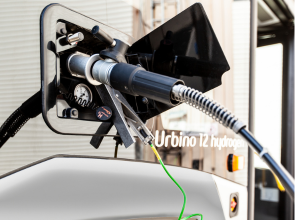South Korea targets over 2,000 hydrogen buses by 2026

South Korea plans to convert more than 250 commuter buses intro hydrogen-fuelled buses by this year and more than 2,000 by 2026, in a concerted effort to raise the uptake of hydrogen vehicles.
The country’s environment ministry will sign a business agreement with seven domestic companies, 12 local governments and seven transportation firms, the ministry said on 4 May. The seven domestic firms are Samsung Electronics, chip producer SK Hynix, steel firm Posco, construction firm Posco E&C, semiconductor firm SK Siltron, auto manufacturer Hyundai Motor and refiner SK E&S.
South Korea also in February revealed a plan to convert 700 buses in Incheon into a hydrogen-fuelled fleet by 2024, with more than 200 buses to be converted this year. Incheon is also one of the 12 local governments involved in the latest business agreement.
The environment ministry plans to “gradually convert commuter buses that are close to people’s lives into hydrogen buses through public-private business agreements to promote the supply of hydrogen buses in earnest”. Hydrogen buses have been distributed based on demand from local governments, with all 283 hydrogen buses supplied by 2022 being city buses.
Domestic hydrogen bus manufacturer Hyundai Motor, one of the seven participating domestic firms, will produce and supply the vehicles, while SK E&S will install and operate liquefied hydrogen charging stations.
Hydrogen vehicles have the advantage of short charging times and long driving distances, with hydrogen buses able to finish charging in 10-20 minutes and able to drive over 500km on a single charge.
“The conversion of hydrogen buses to hydrogen buses will accelerate the popularisation of hydrogen cars,” said environment minister Han Hwa-jin. “We will speed up the supply of hydrogen cars by quickly converting airport buses and local city buses to hydrogen buses.”
Higher uptake of hydrogen vehicles is in line with the hydrogen roadmap the government released in November 2022, where it envisioned the transportation sector as one of the key drivers of large-scale hydrogen demand. South Korea aims to raise its supply of high-mobility vehicles such as hydrogen buses and trucks, with a goal of producing 30,000 hydrogen commercial vehicles and building 70 liquid hydrogen refuelling stations in the country by 2030.
